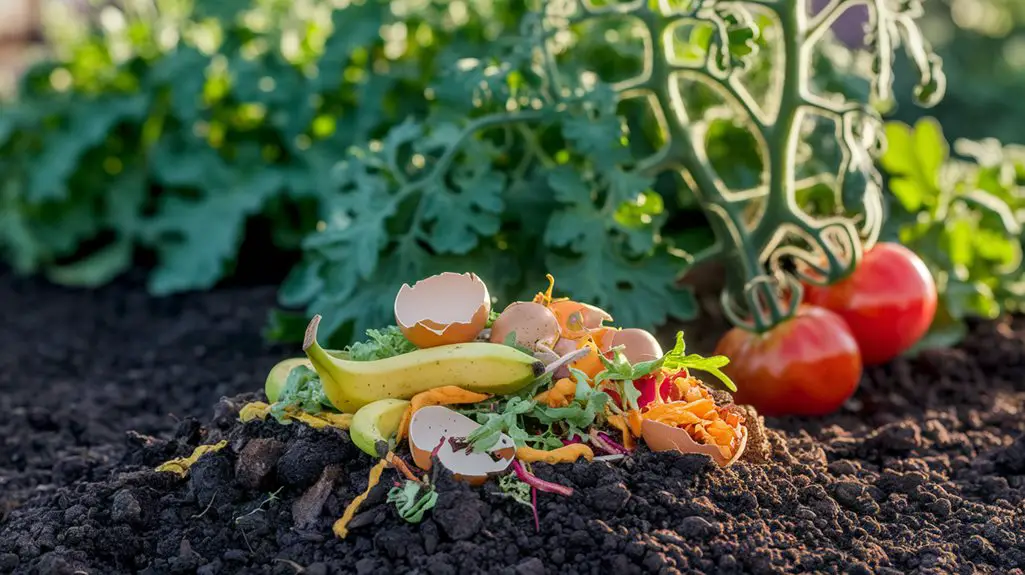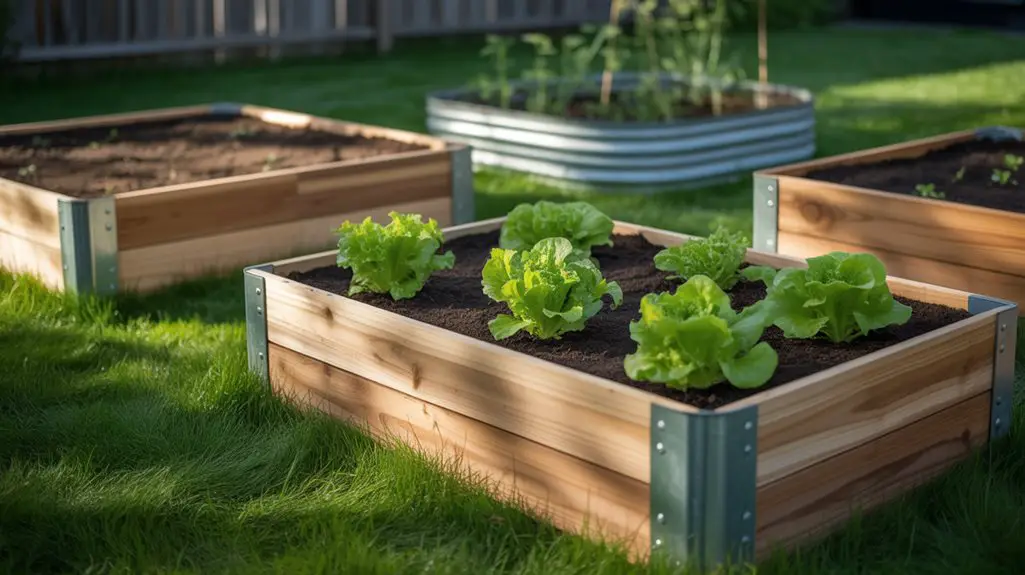Kitchen scraps represent one of gardening's most overlooked resources hiding in plain sight. You're likely discarding potential plant food every day without realizing it. These household food remnants contain essential nutrients that commercial fertilizers attempt to replicate—often at considerable expense. By redirecting your coffee grounds, eggshells, and vegetable trimmings from the trash to your garden beds, you'll cultivate healthier plants while simultaneously reducing your environmental footprint. The transformation of these "waste" materials holds surprising benefits for your soil ecosystem.
The Environmental Benefits of Repurposing Food Waste
When you divert kitchen scraps from landfills to your garden, you're actively participating in reducing methane emissions—a greenhouse gas 25 times more potent than carbon dioxide. This simple practice creates a closed-loop system in your household, transforming potential waste into valuable resources.
Food scraps contribute considerably to municipal solid waste streams, with Americans discarding approximately 40% of their food. By composting these materials, you're decreasing landfill volume while simultaneously building soil carbon sequestration capacity.
Additionally, your repurposed organic matter enhances soil structure, improving water retention and reducing irrigation needs. This practice eliminates the energy costs associated with waste transportation and processing.
You'll also reduce your need for commercial fertilizers, whose production generates substantial carbon emissions and depletes finite resources like phosphorus.
Nutrient-Rich Compost From Kitchen Leftovers

Kitchen scraps transform into black gold through proper composting, providing your garden with essential macronutrients otherwise lost to landfills. This homemade compost delivers nitrogen, phosphorus, and potassium—the NPK trio critical for plant health—directly from your daily food waste.
Coffee grounds contribute nitrogen while boosting soil structure. Eggshells release calcium that prevents blossom-end rot in tomatoes and strengthens cell walls. Banana peels supply potassium that enhances flowering and fruiting processes. Even vegetable trimmings break down into micronutrients that feed beneficial soil organisms.
You'll notice the difference in your plants' vigor when you apply this nutrient-dense amendment. Unlike synthetic fertilizers, kitchen scrap compost releases nutrients slowly, creating a sustained feeding cycle that improves soil biology while reducing your gardening costs and environmental footprint. Additionally, natural pest control can be enhanced by using compost, as it promotes a healthier ecosystem in your garden.
Money-Saving Advantages of Garden Recycling

Recycling kitchen scraps in your garden directly impacts your household budget through multiple financial channels.
You'll eliminate the need for commercial fertilizers, saving $20-60 annually depending on garden size. These nutrients—nitrogen from coffee grounds, potassium from banana peels, calcium from eggshells—would otherwise require purchased amendments.
You'll also reduce waste disposal costs. Many municipalities charge by volume for trash collection; diverting 30% of your household waste to compost translates to measurable savings.
Water bills decrease too, as compost-rich soil retains moisture more effectively, reducing irrigation frequency by up to 30%.
Additionally, using kitchen scraps contributes to sustainable vegetable gardening, which promotes environmental health and biodiversity in your garden.
The cumulative financial benefit extends beyond direct savings—your homegrown produce costs less while delivering superior nutritional value compared to store-bought alternatives grown with synthetic fertilizers.
Best Kitchen Scraps for Garden Health
Not all kitchen waste offers equal benefits to your garden ecosystem, so selecting the right scraps becomes essential for ideal soil health.
Coffee grounds, rich in nitrogen, boost microbial activity and deter slugs. Crushed eggshells provide calcium carbonate while creating sharp barriers against soft-bodied pests.
Banana peels deliver potassium that strengthens plant cell walls and disease resistance. Vegetable scraps like carrot tops, cucumber ends, and lettuce cores decompose quickly, releasing valuable nutrients.
Citrus peels, though acidic, benefit alkaline soils when used sparingly. Tea leaves contribute tannic acid that improves soil structure.
Avoid meat, dairy, and oily foods that attract pests and slow decomposition. Instead, focus on plant-based materials that break down efficiently. Additionally, incorporating effective pest control methods can further enhance the health of your raised garden beds.
Always chop larger scraps to accelerate decomposition and nutrient availability to your plants.
Creating a Simple Kitchen-to-Garden System
To transform food waste into garden gold, you'll need an efficient kitchen-to-garden system that minimizes effort while maximizing benefits.
Start by placing a dedicated container with a tight-fitting lid under your sink for collecting vegetable peels, coffee grounds, and eggshells. When full, transfer these scraps directly to your garden beds or compost pile.
For direct application, bury fruit and vegetable scraps 4-6 inches deep near plants that will benefit from their nutrients. Coffee grounds work perfectly as a top dressing around acid-loving plants.
For longer-term benefits, maintain a three-bin composting system: one for fresh scraps, one for actively decomposing material, and one for finished compost. Turn materials weekly with a pitchfork to accelerate decomposition.
This streamlined approach guarantees nutrients cycle efficiently from kitchen to soil.
Avoiding Common Mistakes When Using Food Waste
While setting up your kitchen-to-garden system establishes the foundation for nutrient cycling, understanding what not to add prevents potential problems. Certain food waste can attract pests or introduce pathogens to your garden ecosystem.
| Avoid These | Why |
|---|---|
| Meat/Bones | Attracts rodents and creates odors |
| Dairy Products | Slow decomposition, causes odor |
| Oily Foods | Disrupts microbial balance |
| Citrus Peels | High acidity slows decomposition |
| Diseased Plants | Spreads pathogens to soil |
Always guarantee proper decomposition before application. Fresh scraps should undergo composting for 3-6 months, while fermented waste requires 2-4 weeks of curing. Monitor your soil pH after additions, as some scraps like coffee grounds can increase acidity. Start with small quantities to observe how your plants respond.
Seasonal Considerations for Scrap Gardening
Seasonal variations greatly impact how you'll utilize kitchen scraps in your garden throughout the year.
In spring, focus on nitrogen-rich materials like coffee grounds and eggshells to support seedling development and early growth.
Summer gardens benefit from potassium-heavy banana peels that help flowering plants withstand heat stress.
Fall is ideal for composting larger volumes of scraps as you prepare garden beds for winter dormancy.
Apply a thicker mulch layer of coarse kitchen waste like corn husks and squash rinds to insulate soil.
During winter, continue collecting scraps indoors through vermicomposting, or store frozen until spring thaw.
Adjust the ratio of green to brown materials seasonally – more nitrogen-rich greens in cool seasons, more carbon-heavy browns in warm periods to manage decomposition rates appropriately.
Pest Management With Kitchen By-Products
Kitchen scraps serve double duty as effective natural pest deterrents throughout your garden ecosystem.
Coffee grounds repel slugs and snails with their abrasive texture and caffeine content. Sprinkle them around vulnerable plants as a protective barrier.
Citrus peels contain d-limonene, a compound toxic to ants and aphids—simply place chopped rinds near infested areas or steep them in water for a potent spray.
Garlic and onion scraps can be macerated in water to create an antimicrobial solution that combats fungal diseases and deters soft-bodied pests.
For vertebrate pests, eggshells mimic predator presence when crushed coarsely.
Hot pepper remnants, when steeped in water with a drop of dish soap, create an effective spray against mammalian browsers due to their capsaicin content.
Success Stories: Transforming Scraps Into Vibrant Gardens
Home gardeners across diverse climate zones have documented remarkable transformations through consistent kitchen waste recycling.
These success stories demonstrate the tangible benefits of integrating organic waste into soil management practices.
- Urban apartment dwellers in Zone 5 have increased container tomato yields by 40% using coffee grounds and eggshell amendments.
- Desert gardeners in Arizona have reduced irrigation needs by 30% through banana peel and vegetable scrap compost incorporation.
- Coastal Pacific Northwest growers eliminated chemical fertilizers completely after implementing layered citrus peel and tea leaf mulching.
- Midwest community gardens transformed clay-heavy soils into productive plots within two growing seasons using apple core and onion skin compost.
Additionally, creating safe backyard spaces for pets can be enhanced by using organic materials from your garden, contributing to a healthier environment.
You'll find similar results possible in your garden through systematic application of kitchen by-products.
Conclusion
Your garden, like a devoted student, will absorb the wisdom you've imparted through kitchen scraps. You've turned waste into wealth, creating a circular economy within your backyard's ecosystem. As you'll continue this practice, you're not just cultivating plants, but participating in Earth's ancient recycling system. Nature's classroom is now in session, and you've mastered one of its most fundamental lessons: nothing is truly waste.




